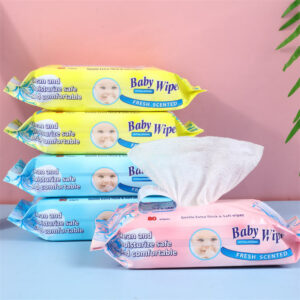When choosing baby wet wipes for babies with skin conditions like eczema or allergies, it’s essential to prioritize products that are gentle, hypoallergenic, and free from common irritants. While specific recommendations may vary depending on your location and product availability
Here are some brands and product lines that are known for their sensitivity to sensitive skin:
- WaterWipes: WaterWipes are known for their simplicity, containing only two ingredients: water and a drop of fruit extract. They are often recommended for babies with sensitive skin, eczema, or allergies.
- Pampers Sensitive Baby Wipes: Pampers offers a Sensitive line of baby wipes that are hypoallergenic, fragrance-free, and dermatologist-tested. These are a good choice for babies with sensitive skin.
- Honest Company Baby Wipes: The Honest Company offers hypoallergenic and plant-based baby wipes that are designed with sensitive skin in mind. They are free from harsh chemicals and fragrances.
- Aveeno Baby Hand & Face Wipes: Aveeno is known for its gentle, oat-based products. Their baby hand and face wipes are designed for sensitive skin and are fragrance-free.
- Babo Botanicals Sensitive Baby Wipes: Babo Botanicals provides baby wipes made with soothing and natural ingredients. They are hypoallergenic and gentle on the skin.
- Cetaphil Baby Sensitive Skin Bath Time Essentials Kit: Cetaphil offers a kit that includes baby wipes suitable for sensitive skin. Cetaphil is a well-known brand recommended by dermatologists.
- Mustela Soothing Cleansing Wipes: Mustela specializes in products for babies and children. Their soothing cleansing wipes are designed for sensitive skin and are fragrance-free.
- Eucerin Baby Eczema Relief Body Cream: While not a wipe, Eucerin’s baby eczema relief cream is an excellent choice for babies with eczema. It can be used in conjunction with gentle wipes for diaper changes.
When selecting baby wipes for a baby with skin conditions like eczema or allergies, be sure to read the product labels to check for hypoallergenic claims, absence of fragrances, and dermatologist recommendations. china best wet wipes for baby manufacturer Additionally, it’s always a good idea to consult with a pediatrician or dermatologist for specific guidance and product recommendations tailored to your baby’s unique needs.
How do flushable baby wet wipes differ from traditional ones?
Flushable baby wet wipes, as the name suggests, are designed to be flushed down the toilet after use. They differ from traditional baby wet wipes in several ways:
- Composition:
- Flushable Wipes: Flushable wipes are typically made from materials that disintegrate in water more easily. They are designed to break down in sewage systems and septic tanks, reducing the risk of clogs or blockages.
- Traditional Wipes: Traditional baby wet wipes are made from materials that do not break down as easily in water. They are not intended for flushing and can contribute to plumbing issues if flushed.
- Biodegradability:
- Flushable Wipes: Many flushable wipes are marketed as biodegradable, meaning they break down naturally over time and are less harmful to the environment.
- Traditional Wipes: Traditional wipes are generally not biodegradable and can contribute to landfill waste when disposed of in the trash.
- Packaging:
- Flushable Wipes: Flushable wipes are often available in packaging that is more conducive to easy dispensing and flushing. They may come in smaller, individually wrapped packets or a pop-up dispenser to prevent drying out.
- Traditional Wipes: Traditional baby wet wipes are typically available in resealable, plastic packages designed for multiple uses.
- Use Cases:
- Flushable Wipes: Flushable wipes are primarily intended for use in toilet hygiene and may be labeled as “flushable toilet wipes” or similar terms.
- Traditional Wipes: Traditional baby wet wipes are designed for various purposes, including diaper changes, cleaning hands and faces, and general cleaning tasks.
- Environmental Impact:
- Flushable Wipes: While flushable wipes are designed to be more sewer and septic-friendly, they can still pose environmental concerns if not disposed of properly. Flushing too many at once or flushing non-dispersible wipes can lead to issues in sewage systems.
- Traditional Wipes: Traditional baby wet wipes contribute to non-biodegradable waste in landfills and can take a long time to break down.
It’s essential to use flushable wipes according to the manufacturer’s instructions. Additionally, some municipalities or regions may have regulations or recommendations regarding the use of flushable wipes, so it’s a good idea to be aware of local guidelines. If you have concerns about the environmental impact, you can consider using alternative methods for diaper changes, such as cloth wipes that can be laundered and reused.
